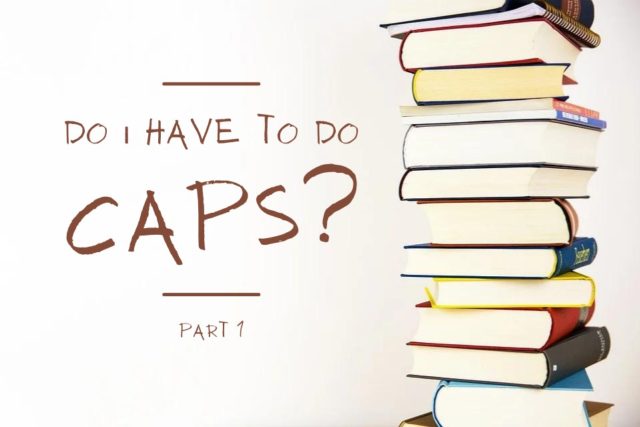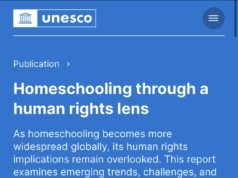
(By Christopher Cordeiro, LearnFree)
As a home educator who investigates registering your child for home education with one of the provincial education departments you would think that this question has a simple and straightforward answer. You may even feel that it should have a straightforward answer, and it should, but as with almost everything to do with registration with an education department, it doesn’t. It is one of the most difficult questions to answer and the reason most probably is because the idea that there could be a child in SA who is not following CAPS would come as a shock to most people.
It is such a complex question that it is going to have to be answered in two parts. In the first part we will deal with “assessment” and in part two with registering with your chosen programme. That is a bit back to front, but you will see that beginning with the end in mind is the most important part to answering this question. In the second part of this article, we will also look at how you can protect your and your child’s home education rights when registering.
The strangest thing about the question “Must I do CAPS” is that 99% of South Africans whose children are in school would never ask it. It is a given in our educational system. The idea that you and your child may have a choice about the curriculum they follow is something most South Africans have never considered. Most independent schools follow CAPS and of the relatively few that don’t some are trying as hard as possible to conform to CAPS.
But freedom to choose any curriculum or approach is at the heart of home education. Even if it is not the reason why everyone starts home educating, research in South Africa seems to indicate that most home educators very quickly move to tailoring their educational programme.
Saying “My children don’t follow CAPS” will mark you out as a strange and possibly dangerous creature in everyday conversation – although that may quickly turn to envy.
After you have told friends and family that your children do not follow CAPS, the follow-up question is: “Can you do that?”.
Well, “CAN you do that”?
“Well, of course you can”, you may want to shout back. Didn’t you just teach your children the difference between “can” and “may”? “You can hang your sister’s Barbie from a tree, but you may not”. What friends, and sometimes fellow homeschoolers are really asking, is “may” you.
That is where things start getting complicated. Of course, if you are not registered for home education you “can” do what you want. You must just be aware of a whole other set of issues.
Programmes, Approaches and Curricula
Right at the beginning there is a confusion. In different places the DBE speaks about what your child is going to be learning using different terms. In some places they talk about a programme and in others about a curriculum.
Home educators on the other hand commonly talk about curricula and approaches. “Curricula” refers to set curricula, like CAPS-compliant curricula and non-CAPS-complaint curricula, like Cambridge, Sonlight, Footprints on our Land or anyone of many others. “Approaches” covers educational approaches that do not follow set curricula, such as Montessori, Charlotte Mason, Eclectic, Unit-Studies and Self-Directed/Natural learning or Unschooling. Some of these may have curricula as part of their approach but in general they do not follow these strictly and use them as a resource rather than the way in which you order learning. A strict division, between those that fall on this side of the divide or on the other, is not as important as the idea that home education uses different approaches. Even home educators using CAPS-complaint curricula mostly do not follow the rigid lock-step approach prescribed by CAPS. They also adopt a different approach and use their CAPS-compliant curriculum in a highly adaptive way. Obviously, the distinction is difficult to draw.
The term “curriculum” used by the department would appear to exclude “approaches”, while “programme” is less restrictive. Those who do not strictly follow a curriculum may struggle to be registered and those who have a curriculum, whatever it is, if it looks familiar to the official, may find it easier. We don’t know if the DBE’s term “programme” means any programme and includes approaches like Unschooling. That is the first of many open questions.
The question is if you fill in those nice forms on the DBE website and say you are doing Self-Directed Learning or Charlotte Mason or Sonlight, will your registration be declined?
Practically, the Pestalozzi Trust is aware of cases where education departments in certain provinces are registering learners who follow alternative curricula. The Trust keeps a record of this, because it sets a precedent. The Trust is not aware of anyone following a Self-Directed/Natural learning or Unschooling approach that has been allowed to register. If you have, the Trust would love to hear from you and in fact, from anyone who has been registered using any curriculum other than CAPS.
Free but not free
Education officials have said there is freedom of curriculum choice. But does that mean freedom to use any curriculum or you are only free to choose any curriculum that is CAPS-compliant? Or any curriculum approved by the DBE?
There are many curricula and workbooks that are CAPS-compliant but choosing from among those does not mean you have freedom to choose any curriculum or approach that is best for your child. It merely means that you can choose from among these CAPS-compliant curricula.
Another possibility is that you will be allowed to choose any curriculum, when you register, whether it is CAPS-compliant or not. The problem in that situation is how will your children be assessed. If they are assessed (at least predominantly) against CAPS, then you will have a problem.
This is like that nightmare so common to students taking exams: you are in the exam hall, you have studied, and you open the paper only to find that this is not the exam you studied for.
If your child “fails” that assessment, you may be subject to an enquiry and your child’s registration for home education may be withdrawn.[1]
Assessment: beginning with the end in mind
It is, therefore, important to understand three things
- The standards against which your child will be assessed. This will tell you what they need to know (the content) and what skills they need to master. Some CAPS, such as those for maths, also talk about “concepts” that need to be mastered.
- How many subjects your child will need to take.
- How they will be assessed.
The Policy on Home Education states that when your child is assessed annually by a competent assessor the standard is “a standard that is not inferior to that which is determined in the NCS”[2].
The NCS is the National Curriculum Statement and it consists of three documents or sets of documents. These are
A. The Curriculum and Assessment Policy Statements (CAPS) for each approved school subject. This answers the question what content needs to be covered and what skills and concepts need to be mastered. Hit the link below to see the standards for each of the subjects that your child will be assessed on. This sets out the content, skills and concepts.
- Foundation Phase
- Intermediate Phase
https://www.education.gov.za/Curriculum/CurriculumAssessmentPolicyStatements(CAPS)/CAPSIntermediate.aspx3. Senior Phase
- 3. Senior Phase
https://www.education.gov.za/Curriculum/CurriculumAssessmentPolicyStatements(CAPS)/CAPSSenior.aspx
We have not included the FET phase. If your child is obtaining a National Senior Certificate i.e. SA Matric, they will have to register with a curriculum provider who is affiliated to an exam body that offers the National Senior Certificate.
B. The National policy pertaining to the programme and promotion requirements of the National Curriculum Statement Grades R – 12. This document sets out the number of subjects to be offered by learners in each grade and the promotion requirements for each of those subjects. Home educators can set their own requirements for promotion, but these must be equal to or exceed the requirements in the Policy.[3] This is where you will discover how many subjects you need to cover. Briefly in the foundation phase (Grade R to 3) you need to cover 4 subjects, in the intermediate phase (Grade 4 to 6) 8 subjects have to be covered, and in the senior phase (Grade 7 to 9) 9 subjects have to be taken. For a summary you can go to page 14 of the DBE’s Home Education Booklet.
C. The policy document National Protocol for Assessment Grades R – 12 sets out how assessment must be conducted. The problem with this document is that it is designed for school-based assessment and not adapted to home education. For the record, the Pestalozzi Trust has made a submission to the DBE and highlighted this.
The DBE has issued a booklet on home education that gives further details on how assessment should take place. One area of concern is that the parent must “ensure validity and reliability in each and every assessment task or examination through necessary control measures including invigilation”.[4] This seems to imply that home learners must be assessed at home in the same manner and subject to the same controls used in schools. This may involve the need for invigilators to be present in your home or you having to take your child to a place where invigilation can take place. This may become a problem when end-of-year exams begin as a form of assessment in the intermediate phase. It is possible that the “competent assessor” will perform the role, but the relevant policies have not been amended to reflect this; so, one must proceed with care and be aware of the dangers.
A “competent assessor” will need to assess your child at the end of every year, you must keep the record of this assessment, and at the end of every phase this report must be sent to the provincial education department.
It is not clear in practice how these requirements will be implemented when a “competent assessor” conducts their assessment.
A further problem is that the assessment process is a “continuous” one. How that will work out in practice also has to be seen.
By the time a parent has read all these documents and the DBE has responded to all the queries their Grade R learner probably will be in Matric. Complying with all of these requirements is very time consuming.
Many home educators who do use CAPS, therefore, use curriculum providers. These curriculum providers ensure that all these administrative requirements are met. Home educators who follow CAPS and use curriculum providers are advised to approach their providers to ensure that the provider does indeed meet these requirements.
A home educator who is registered and follows a CAPS-complaint syllabus, but is NOT working through a curriculum provider, is likely to have to meet all these requirements. Although how strictly an individual “competent assessor” will assess learners is an open question. The likelihood is that it will be fairly or even very lenient at first and then become stricter over time. We have seen this with the home educators doing the National Senior Certificate i.e. SA Matric. Over the years the requirements, which always existed but were often ignored, have gradually been more strictly enforced. Many fewer centres have been allowed to conduct exams and the requirements for year marks and assessment in the more practical subjects have become stricter.
Even as a registered home educator who does not use CAPS it is possible that your child will be assessed according to the CAPS standards, as this appears to be what is required by the Policy on Home Education.
Given these challenges how can you best protect your and your children’s rights?
In the second part of this article we will turn to this. Although as a
bit of a spoiler we will say – the key is making sure you agree with the
education department when you register on how you will be assessed. That then
hinges on the curriculum that you are using. Therefore, in part two we are
going to first look at how to register with your chosen curriculum or approach
and explain how to protect your and your children’s rights right at the
beginning. [Please Note: Any legal
information contained herein is intended for general informational purposes
only. It is not a substitute for legal advice from an attorney licensed to
practice in your jurisdiction with knowledge of your specific legal issue, and
you should not rely upon such legal information. Members of the Pestalozzi Trust are advised
to contact the Trust, who will assist you and where necessary and appropriate,
place you in contact with a registered member of the legal profession. A
reminder that the legal costs of Trust members are covered by the Trust.]
[1] Clause 18(6)(2) “A report from a competent assessor which shows that a learner has not met the minimum outcomes and standards at the end of the phase assessed by the competent assessor may provide grounds for a review of a learner’s registration for home education …” Policy on Home Education 2018.
[2] Clause 13(1)(a)(iii) Policy on Home Education 2018.
[3] Clause 18(7)(1) “A parent may set her or his own promotion and retention requirements provided these are equal to or exceed the standard or requirements set in the National Policy Pertaining to the Programme and Promotion Requirements of the National Curriculum Statement (NCS) Grades R – 12.” Policy on Home Education 2018.
[4] p17 Home Education Booklet. You can download a copy of the booklet here





